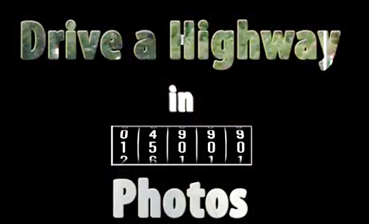
Ever hear of a kineograph? We hadn’t until now, but we knew about the more common term for the same thing: a “flip book”. You’ve probably seen them before – a thick book filled with pictures that seems to come alive when you flip through the pages. It may seem like a primitive form of entertainment now, but back in the day, it was the equivalent of a home theater system, without the surround sound, of course.
What do flip books have to do with transportation? We’ll make that connection in just a bit, but to start, it’s fair to say if you want a good flip book, you need lots of pictures to make it work. And we’ve got millions of pictures of roads.
Usually when people say, “millions”, they really mean, “a lot”.
Not us. We literally have millions of images.
Every few years we send a vehicle on the road outfitted with a camera and special instruments. In addition to checking the road for smoothness, rutting, cracking, potholes and other issues, the camera is set up to automatically take a photo every 10 metres. The vehicle then drives our highways, and we end up with a fairly comprehensive reference of what our roads are like. The images we collect are gathered into what we call the “Photolog”. Before services like Google Street View, it was the way for ministry staff to take a virtual highway tour, and it was an indispensable tool to help manage our rehabilitation program and ensure we were fixing the roads that needed it the most. Even though we can now use any number of online services to see our roads, the Photolog is still an essential tool, because it combines a visual reference with a lot of other important data.
The Photolog has been going for over 50 years, so delving through the archives is a bit of an adventure. We find the photos are spread across all kinds of different formats. There’s 16mm film, VHS tape, laser discs, and most recently digital photos on hard drives. There’s enough old media here to make a film student feel like Indiana Jones.
So, back to the flip book. We’ve got a mountain of still photos of highways to pull from. If you look at them fast enough, one after the other, it looks like you’re driving. Fast.
It’s time for a video, flip book style…
For our first video, we chose Highway 5 – the Coquihalla – as it appeared in 2008. The pictures begin just outside of Hope and continue until the highway passes near Merritt. Check it out and see what it feels like to travel this stretch in 3 minutes.
Any requests for other highways? If so, leave us a comment below or connect with us on Facebook and Twitter and let us know.
Is there a map showing all of the photolog routes?
Hello!
The photolog routes are the same as our numbered highway routes, give or take a few. So a map of provincial numbered routes would do. https://www.th.gov.bc.ca/popular-topics/maps/bcmaps.htm#numbered
The above link is broken. The new gov’t website doesn’t appear to include this.
Hi Byron – here’s an updated link – thanks for the flag!
https://www2.gov.bc.ca/gov/content/transportation/transportation-reports-and-reference/reference-information/numbered-routes/numered-routes-map
Lytton to Lillooet
Fraser Canyon is a must!
Thanks for the feedback Scott! We will put it on our list. Stay tuned!
Leed59@hotmail.com
Worked for Dept of Hwys from 1966- 1972 ,, would love to see film of Fraser canyon Boston bar – sp. bridge please
Hi Lee!
You are in luck, and you may be in the movies, because we have a photolog from 1966 through the Fraser Canyon right here: https://www.youtube.com/watch?v=5tasVOUYh_Y
Let us know what you think!
Do you have photologs of the Upper Levels Highway in 1966? I was born in North Van at Lions Gate Hospital in 1960 and grew up in North Van. It would be cool to see old film of the Upper Levels at that time.
Hi Will,
We do, please stay tuned for more. We are trying to highlight all areas of the province to start and then we will go work on other routes in areas we have already featured.
How about the Fraser Canyon in the 40s & 50s … when the road between Yale and the (old) Alexandria bridge was built out over the river … with timber? And Jackass Mountain was gravel switchbacks? Yep, scared the beejeepers out of the prairie farmers, it did.